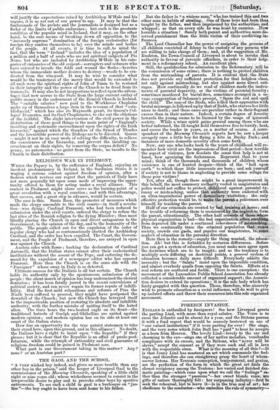THE GAOL AND THE SCHOOL "A TERT wicked boy indeed,
and gives us more trouble than any other boy in the prison," said the keeper of Liverpool Gaol to the commissioner of the Morning Chronicle, speaking of a little child eight or nine years old; whose wickedness seemed to consist in the irrepressible desire to play and to provoke other boys by sportive enticements. To see such a child in gaol is a burlesque on "jus- tice "—the boy ought to have been sent home to his father. But the father is "a vicious man," who has trained this and two other eons in habits of stealing. One of these boys had been thus taught by the father, and then imprisoned by the authorities, and whipped; so that on every side he was beset by enemies. How horrible a situation ! Surely both parent and authorities more de- served punishment than the little victim of their conflicting in- fluences.
The Lord Chancellor has the power of assigning the persons of all children convicted of felony to the custody of any persons who are willing to take charge of them ; and, at the suggestion of Mr. Rushton, the Town-Council of Liverpool is about to invoke that authority in favour of juvenile offenders, in order to their lodg- ment in a reformatory school. An excellent plan.
Still, the qualification for admission to the Reformatory will be the commission of some crime ; there is nothing to protect dren from the misteaching of parents. It is evident that the,
does not provide any sufficient protection for that helpless Class, not only against misteachiug, but also against more direct, gat- rages. How continually do we read of children made the instru- ments of parental depravity, or the victims of parental ferocity ; sometimes murdered for burial-fees, soinetirn.es scourged in a sa- vage exaggeration of Solomon's precept, "Spare the rod and spoil the child." The case of the Birds, who killed their apprentice with brutal misusage, is followed upby that of Bubb, who starves her little niece to death ; and these cases are peculinr rather in their flagrant excess than in their nature. Indeed, a certain degree of ferocity towards the young seems to be licensed by the usage of ignorant society. While a wiser spirit grains ground among those who are better-informed, the ill-taught hold themselves free to terrify, beat, and coerce the tender in years, as a matter of course. A corre- spondent of the Morning Chronicle reports how he saw a keeper savagely cane a little boy for flying a kite in Bushy Park ; and instances of more domestic severity often conic forth.
Now, any one who looks back to the years of childhood will re- member how vivid are the impressions of that period—how terrible the aspect of violence, how desolate the sense that help is not at hand, how agonizing the forlornness. Represent that to your mind; think of the thousands and thousands of children whose existence is one of hunted despair—think of the " hell upon earth" to which those little innocents are burn; and ask yourself if society is not to blame in neglecting to provide seine refuge for those poor victims?
Yet, after all, though there might be a great improvement in. this behalf, the most summary authority vested in magistrates and police would not suffice to protect childhood against parental ty- ranny or misteaehing, unless that authority were endowed with an ultra-inquisitorial power o domiciliary visitation : the only effective protection would be, to make the parent a policeman over himself, by teaching the parent.
Half of our criminals are created by bed training at heme ; and the trouble of reforming them is occasioned by the neglect.to form the parent, educationally. The other half conauits of those whose physical organization is bad—the bad organization often resulting from depraved life under a continued inheritance of raisteaelling. Thus we continually trace the criminal population that vexes society, crowds our gaols, and puzzles our magistrates, to some neglect of education in the parental direction. Here then is the remedy—supply the thing wanted, the educa- tion. Ah! but this is forbidden by sectarian differences. Before you can get a system of education, you must make men agree upon the doctrines which are to be taught; and as the tendency is to multiply sects differing on doctrinal points, a general system of education becomes daily more difficult. Everybody admits the necessity; but the " Saints " insist upon the impossible condition, and almost everbody quails from opposing the Saints. Efforts at a real reform are scattered and feeble. There is one exception: the movement of the Lancashire Public School Association has already collected a considerable amount of organized support; the Associa- tion desires to extend its operations • it is the sole body which has
fairly grappled with this question. operations; therefore, who sincerely wish to promote education as a social influence, will do well to give up isolated efforts and throw their resources into this sole organized movement.


























 Previous page
Previous page